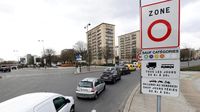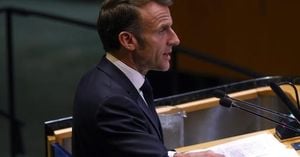On Wednesday, March 26, 2025, a significant shift occurred in the French legislative landscape as a special commission voted to abolish the "Low Emission Zones" (ZFE), a controversial measure aimed at reducing air pollution in major cities. The decision, which passed against the government's wishes, has reignited the debate over environmental policies and their impact on low-income households.
The ZFEs were introduced in 2019 under the Mobility Orientation Law and were later reinforced by the Climate Law of 2021. Their primary goal was to enhance air quality by restricting access to certain urban areas for the most polluting vehicles. According to Santé Publique France, fine particle emissions contribute to around 40,000 deaths annually due to respiratory diseases. Despite their intended benefits, critics argue that these zones disproportionately affect low-income families who cannot afford to replace older vehicles with cleaner alternatives.
The commission's vote was notably close, with 26 members in favor, 11 against, and 9 abstentions. This outcome was facilitated by amendments proposed by the Republican right and the National Rally, garnering support from some lawmakers within the ruling coalition and abstentions from several left-wing deputies. Ian Boucard from the Republican party articulated the concern, stating, "The ZFE exacerbates social inequalities by forcing low-income households to choose between significant additional costs for a new clean vehicle or forgoing mobility altogether."
In a similar vein, Pierre Meurin of the National Rally labeled the zones as "unnecessary for improving air quality" and described them as creating a "strong social wound" and territorial separatism. These sentiments reflect a growing discontent among certain political factions regarding the ZFE's implementation and its perceived failure to address the needs of all citizens.
Despite the push for abolition, the government has defended the effectiveness of the ZFE. Marc Ferracci, the Minister of Industry and Energy, attempted to persuade the commission to reconsider, citing international studies that demonstrate the positive impact of such zones on emission reductions. He noted, "A number of experiences, particularly abroad, have shown that ZFEs have an effect on reducing emissions."
Agnès Pannier-Runacher, the Minister of Ecological Transition, pointed out that in cities where ZFEs were active, such as Lyon and Paris, nitrogen dioxide concentrations had decreased by over a third. However, these reassurances did little to sway the commission's decision.
The ZFE policy has long been a point of contention in France, particularly as cities like Paris and Lyon have implemented strict regulations against older vehicles, categorized under the Crit'Air sticker system. As of January 1, 2025, the circulation of Crit'Air 3 vehicles—those registered before 2006 for gasoline and before 2011 for diesel—has been limited in these urban areas. This move was intended as a pedagogical measure to encourage the transition to less polluting transportation options.
In response to the commission's vote, the association "40 million motorists" expressed its satisfaction, calling the decision a "great victory for motorists." Philippe Nozière, the association's president, stated, "We are delighted with this decisive victory against an unjust measure that jeopardized millions of drivers." However, legal experts caution that the vote does not immediately nullify the ZFE. Arnaud Gossement, an environmental law specialist, warned that the removal of the ZFE could put France in violation of European environmental laws, as the country has previously faced scrutiny for its slow implementation of pollution control measures.
The debate surrounding the ZFE is not merely about environmental policy but also about social equity. Critics of the zones argue that without adequate support for low-income families, the push for cleaner air becomes a burden rather than a benefit. Sandrine Nosbé from La France Insoumise noted, "The ZFE were developed without any effective alternatives to individual car travel," emphasizing the need for a more comprehensive approach to urban transportation.
Looking ahead, the bill to abolish the ZFE will be presented to the National Assembly for a public vote, scheduled for April 8, 2025. Additionally, the Republicans have proposed a cross-party bill aimed at establishing a five-year moratorium on the ZFE, allowing for a more thoughtful approach to their implementation. This proposal, backed by five parliamentary groups, seeks to create more uniform conditions across the country and provide better support measures for motorists.
As the legislative process unfolds, the future of the ZFE remains uncertain. The ongoing dialogue reflects a broader struggle to balance environmental goals with the economic realities faced by many citizens. The outcome of the upcoming votes will be critical in determining how France navigates this complex issue.








